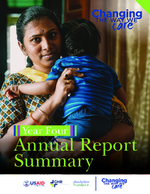
Background Information
I obtained my Master's degree in Sociology and Bachelor's degree in Law during the 1990s. My career in the development sector commenced in 1992, focusing on health and hygiene initiatives within tribal communities. In 1994, I co-founded ARUNA with colleagues in the Indian state of Odisha, aiming to prevent HIV transmission among migrant populations. I became a member of the Indian Network of NGOs on HIV & AIDS (INN) and served as its National President for five years.
In 2006, I represented India at the United Nations General Assembly Special Session on AIDS (UNGASS). My work has involved collaborating with migrants, transgender individuals, female sex workers, youth, and adolescents to combat HIV. I have provided counseling and support to over 2,000 individuals living with HIV, including 500 children. In partnership with Ganjam district administration, I co-founded a Child Care Institution in 2007 for children orphaned by HIV. My extensive experience working with diverse groups, and exclusive experience with the parentless children, has enabled me to focus on care reforms, particularly in non-institutional care.
For the past several years, I have been leading the Changing the Way We Care project and mission in the state of Odisha, India. I have collaborated with multiple United Nations agencies and international non-governmental organizations as a lead representative from the partner organization ARUNA. This experience has provided me with valuable learning opportunities in areas such as HIV, child protection, and various other development topics. Additionally, I have taken a lead role in both local and national NGO and civil society organization networks.
Expertise:
With over 30 years of experience in development practice, I possess extensive expertise in HIV prevention, particularly in the area of preventing parent-to-child transmission. My background in child protection spans more than seven years, during which I have concentrated on non-institutional care, emphasizing gatekeeping to avert unnecessary family separations and facilitating the reintegration of children from Child Care Institutions (CCIs) back into their families. My efforts include engaging with government entities, enhancing the capacity of the child protection workforce, and collaborating with local self-governance systems to garner support for vulnerable children within their communities. Additionally, I am dedicated to promoting foster care and kinship care, which are vital areas where I invest my energy and experience.
Membership & Associations
Our Interview With Practitioner
I collaborate with government stakeholders to foster inter-departmental alignment in support of local initiatives. This includes disseminating and replicating research-based findings with governmental entities, NGOs and other development practitioners.
The primary focus should be on strengthening families. Enhancing communities and the local governance framework to tackle the vulnerabilities faced by children, along with the aim of promoting the "localization of SDG," represent two significant advancements in supporting vulnerable children and their families.
The formulation of the "District Action Plan (DAP)" concerning non-institutional care on an annual basis for the revenue districts of Odisha, India, constitutes the foundation of our initiatives under the "Changing the Way We Care" programme.
Additionally, the creation of a training curriculum for the child protection workforce, along with training modules and implementation guidelines, serves as essential support aligned with the DAP.
My extensive experience of over thirty years in the field of HIV and AIDS has led me to engage with CABA (Children Affected by AIDS) and the most vulnerable adolescents, significantly enhancing my understanding of the challenges faced by at-risk children.
Additionally, my decade-long involvement with HIV-infected children in institutional settings has provided me with firsthand insights into the detrimental aspects and consequences of institutional care.
This experience has reinforced my belief that there is no substitute for family and family-like care for every child.
Enhancing family stability is essential to avert the separation of children from their families in at-risk circumstances. By fortifying family units, we can reinforce kinship ties and guarantee that vulnerable children receive care within a familial context.
This component has been integrated into the annual "District Action Plans (DAPs)." To strengthen the local governance framework, we have created a tool that enables local systems to access the necessary support for vulnerable children within the Juvenile Justice ecosystem in India.
Where They Operate
Key Areas of Work
Languages Spoken
Practitioner Resources
Changing the Way We Care (CTWWC) promotes safe, nurturing family care for children reintegrating from residential care facilities (often referred to as “orphanages”) and prevents child-family separation by strengthening families, reforming national systems of care for children, and working to shift donor and volunteer support away from residential care and toward family care alternatives.

